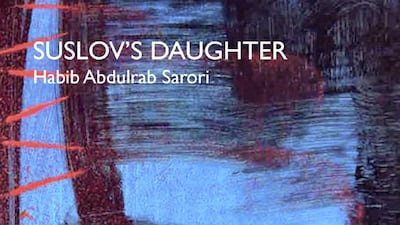Five decades of modern Yemeni history unfold in Habib Abdulrab Sarori's Suslov's Daughter, a political tale told through five different romances.
The skillful translation, by Elisabeth Jaquette, draws out the book's sardonic humour.
Longlisted for the 2015 International Prize for Arabic Fiction, the novel opens with a playful children's march in 1962 and ends after the uprising in 2011. Imran, the narrator, tells his life story to a silent but amused character called 'Death'. He begins in Aden, Yemen's southern port city, "where people lived to laugh, and lived on laughter". He calls it a "city of ships and sailors", as it was once fondly described by great poets such as Saadi Youssef and Mahmoud Darwish.
When the story begins, "Adeni life, dear Reaper, was secular and modern[.] Women didn't wear religious clothes. They were educated, worked, and took part in senior party leadership." The city, Imran says, "was an international capital in the making".
Yet Imran's first beloved has no personality. She remains merely "Suslov's daughter", while Suslov is head of the local Graduate School for Marxist-Leninist Sciences. Her real name is Faten, which means 'alluring', but the narrator tells us to call her Hawiya, meaning 'the abyss'.
Faten/Hawiya disappears and Imran's next great love is an Ethiopian prostitute called Ms Doctor. She has no substance beyond her profession, which she plies during the early post-colonial years in the south.
Soon, rule is tightened and a more Soviet system is formed. In one of the book's funniest moments, a committee is unable to decide whether the narrator is from a working-class or petit bourgeois background. So they form a subcommittee to visit his father's tiny fish restaurant and tally up the spoons. By spoon count, he's bourgeois.
Ms Doctor disappears during the mid-1970s when, like other sex workers and homosexual men, she's arrested. The prostitutes are reassigned work in a tomato canning factory. We never hear what happens to the men. After this, the young narrator – like the book's author – moves to France, still hoping to see "the sunset of capitalism".
This new period brings a third woman, Najaa, who is half-French, half-Yemeni. Like the other women, she lacks a personality, but "Integrity, sincerity, and devotion were written into her very DNA".
With her, the narrator shifts his political position from anti-colonial Communist to secular Francophile leftist. "And I abandoned uprisings in exchange for deep social transformations."
The couple continue to visit Aden every summer, where the narrator still follows the life of his first love, Faten/Hawiya. Her family, like the country, has descended into civil war. Through the 1980s, Faten/Hawiya's parents pursue a fierce and bloody fight, which ends with their daughter's escape to the northern city of Sana'a. In Imran's words, she "fled progressive Yemen to regressive Yemen".
Following the country's 1994 war, "Aden became a city humiliated, the spoils of war". Then, a year later, Najaa is killed in a July 1995 terrorist bombing in Paris, but the grieving Imran continues to work and live there. His centre of gravity shifts back to Yemen once more, however, with his fourth, penultimate romance.
_________________
Read more:
Book review: Ma’n Abu Taleb’s All the Battles is a hard hitting metaphor for life
Book review: Imperial Muslims: the fluidity of existence of mortal men
Book review: John Lyons lays bare the tyrannies of Israel’s apartheid state in memoir
_________________
Imran's new love is a Salafi leader called Ama al-Rahman, a powerful yet submissive woman who could be said to be cut of the same cloth as Mrs Waterford from the recent television production of The Handmaid's Tale. Ama al-Rahman, we discover, is the same Faten/Hawiya of Imran's childhood. Still a caricature, the woman who was once (the communist) Suslov's daughter, is now (the Salafist) Sheikh Al-Hamdani's daughter-in-law.
By the early-2000s, the narrator shares his beloved, and Yemen has been ripped to pieces: there is south and north, Aden and Sana'a, secular and Salafist.
Everything shifts again in 2011, when a revolution promises to bring the pieces back together. In Change Square, Faten/Hawiya/Ama al-Rahman seize the moment; now, Imran says, "Hawiya and I both trembled with the same revolutionary dream".
Yet the uprisings are soon crushed. In their wake, Imran flees his country, returning to France. There, instead of engaging with Yemen's problems, he reads Sun Tzu's The Art of War, which enthralls him as The Origins of Marxist Philosophy once did. He meets his last beloved, Yan Lio, who represents China, a land of "total intelligence and absolute silence". The narrator, who once looked to Russia, then to France, now orients himself entirely by China.
If the reader can step around the cardboard depictions of women, Suslov's Daughter is an enjoyably ironic, if hastily sketched, allegory of modern Yemen. But more than that, it's a portrait of a man in need of direction, looking for an ideology, anywhere but within.

